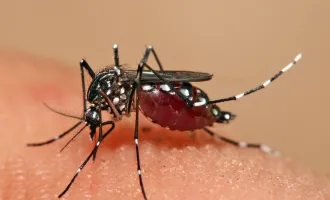Breakthrough Prize in Life Sciences Symposium Celebrates Biologists as Celebrities
Actors such as Jon Hamm and Cameron Diaz are no strangers to extravagant events such as the Oscars or Emmys. But when they attended a recent gala in Silicon Valley, there was something different: scientists were the stars.
The 2015 Breakthrough Prize winners were announced on Nov. 9 at a ceremony at NASA Ames in Silicon Valley. The event was catered by the esteemed restaurant The French Laundry, hosted by Seth MacFarlane and with celebrity award presenters such as Hamm, Diaz, Benedict Cumberbatch and Elon Musk, CEO of Tesla and SpaceX.
“This year’s Breakthrough Prize winners have made discoveries that will help cure disease and move the world forward. They deserve to be recognized as heroes,” said Mark Zuckerberg, who co-founded the prize with Priscilla Chan, Sergey Brin, Anne Wojcicki and Yuri and Julia Milner in 2013. Several news sites have since referred to the prize as the “Oscars of Science.”
The day after the gala, the laureates participated in panel discussions at the three Breakthrough Prize Symposia held at Stanford University: Life Sciences, Physical Sciences, Mathematics. At the second annual Life Sciences Symposium (the first was held at UCSF in Dec 2013), a group of students and postdocs from UCSF, Berkeley and Stanford asked the new winners about their careers, mentors, the role of collaboration, future directions, and of course the burning question: what will they do with the $3 million in prize money? The common answer: they want to invest in younger scientists.
The winners of the 2015 Breakthrough Prize in Life Sciences are:
- Dr. C. David Allis (Rockefeller University), for the discovery and work on histone modifications in gene regulation and chromatin organization
- Dr. Alim-Louis Benabid (Joseph Fourier University), for the discovery and work on deep-brain stimulation in treatment of Parkinson’s Disease
- Dr. Emmanuelle Charpentier (Helmholtz Center for Infection Research and Umea University) and Dr. Jennifer Doudna (UC Berkeley, Lawrence Berkeley National Laboratory, HHMI), for the development of the CRISPR/Cas system for genome editing
- Dr. Victor Ambors (University of Massachusetts Medical School) and Dr. Gary Ruvkun (MGH and Harvard Medical School), for discovering microRNA and its mechanism of gene regulation
The winners were candid and lighthearted in discussing their science careers: “When I was at your stage, in every experiment I did, something went wrong,” said Allis. In fact, as a young professor, when he saw a Cell publication claiming that chromatin was dispensable to cells, he went home thinking his career was over.
Benabid said that the secret to his success was: “Luck, and luck, and luck.” He also thanked his patients: “When you ask a patient if you can put your finger in their brain, they say OK!”
Ruvkun admitted that: “I’m not much of a mentor. I’m not good at controls.”
Jokes aside, all the scientists credited the great mentors, collaborators and trainees they had worked with throughout their careers. Another common thread was their inspiration to ask questions at an early age. Speaking of the future of science, they underlined the power of collaboration between laboratories, institutions, and disciplines.
The day-long symposium also featured short lectures from this year’s 2014 Breakthrough Prize in Life Sciences laureates:
- Dr. James P. Allison (MD Anderson Cancer Center), for the discovery and work on T cell checkpoint blockade in cancer therapy
- Dr. Mahlon R. DeLong (Emory University), for defining the brain circuits implicated in Parkinson’s Disease
- Dr. Michael N. Hall (University of Basel), for the discovery and work on TOR in cell growth
- Dr. Robert Langer (MIT), for the development of controlled drug delivery and release systems
- Dr. Richard P. Lifton (Yale University and HHMI), for the discovery of the genetics and biochemistry of hypertension
- Dr. Alexander Varshavsky (Caltech), for the discovery of the molecular and cell biology of protein degradation
The 2014 laureates shared the history of their groundbreaking discoveries, future research directions, views on the future of science, and above all their passion for the intricacies and beauty of biology. Dr. Varshavsky described his ideas of engineering novel protein degradation systems with a barely-contained excitement: “Is it feasible? On paper: for sure. In reality: I think so. Has it been done? No.”


